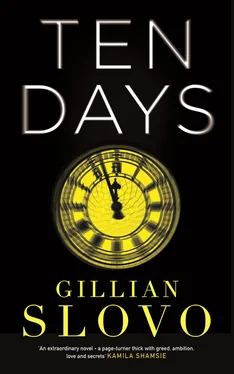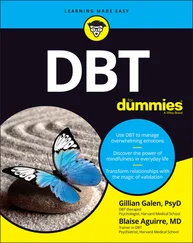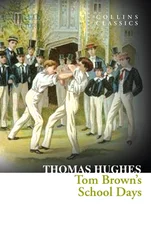‘Okay, then.’ Without taking her eyes off him, Cathy called, ‘Officer, please join us.’
She had been so concentrated on making the small space they occupied safe for Ruben that all thoughts and all sounds had faded. Now she felt rather than heard the sergeant closing in.
‘I’m going to take down his hood,’ she said. ‘Please don’t touch him.’
She took the policeman’s silence as consent. She stretched up her arm, ‘No one but us can see,’ and nudged the hood off Ruben’s bald head.
He let out a strangled cry, and both his hands shot up to cover his face.
‘I’m sorry, ma’am, I have to have a proper look.’
She almost had to stand on tiptoes to take hold of Ruben’s hands and pry them away.
‘Reaction,’ Ruben whispered. He was still trembling.
‘Satisfied?’ Cathy didn’t wait for the policeman’s reply. ‘You did great,’ she said, letting go of Ruben’s hands. ‘You can put back your hood.’
He pulled his hood over his head so roughly that it covered his eyes. ‘Action,’ he said. His voice was louder now than it had been before. ‘Traction.’ And his arms wilder.
‘It’s okay.’ Out of the corner of her eye she saw the sergeant’s confirming nod. ‘You can go.’
Ruben took a step forward and seemed to stumble. It happened sometimes — his legs just gave out on him.
She resisted the impulse to help. She got out of his way so he could stretch both arms out as if the air would support them. Then at last, with his head hung low, he shambled away, a wounded bear in search of his cave. ‘Option,’ he muttered. ‘Action.’ His face was crumpled in distress. ‘Traction. Mischief.’
‘Show’s over.’ The younger policeman now tried to exert an authority that had so far eluded him.
The onlookers did not move on. They looked at him and his colleague. And did not speak.
‘Move along.’ His quivering Adam’s apple indicated that he had a lot to learn before he could exert authority over such a disaffected bunch. Which was probably fortunate, Cathy thought: a more experienced officer might have gone in harder, with unpredictable consequences.
‘If there’s trouble,’ Marcus told the crowd, ‘it’ll be us that suffers for it. Ruben is safe. Let’s go back to our lives.’ At which the crowd did begin to disperse.
‘Well then,’ this from the young policeman.
‘Break it up,’ the sergeant told the air.
As Pius began to tell the sergeant what he should have done, their voices faded from Cathy’s consciousness. Her first sensation had been relief that Ruben was safe. But now something else was bothering her. Something out of kilter. Something missing.
Someone.
Banji.
Where had he got to? Out of the corner of her eye she saw the sergeant stalk off. ‘Have you seen Banji?’
‘He’s over there.’ Marcus pointed to the far end of the market where Banji was still standing.
He didn’t notice her looking. He was too busy watching Ruben.
‘How come he didn’t help?’
She must have spoken the thought aloud, because Marcus came back with, ‘That coconut. He thinks only of his own skin.’
Knowing that there was little love lost between the two men, she didn’t reply. Besides, she couldn’t help thinking that Marcus was right: Banji had been the first to spot trouble looming, and yet when she had gone to help, he had abandoned her.
Again.
As he had done early this morning.
And fifteen years ago.
She sighed.
‘Something troubling you?’ This from Pius.
‘Nothing I can’t handle,’ she said, hoping it was the truth.
8.30 p.m.
Mr Hashi had asked Jayden to come early, which meant he’d had to skip school, and then Mr Hashi had also asked him to stay on late. Okay by Jayden. He needed to earn enough to see them through until his mother’s next disability payment.
He carried the last of the plastic bins inside, stacking them below the left side shelf as Mr Hashi had taught him to do. He stretched up on tiptoes, removing the long hook from where it hung and, taking it outside, used it to pull the shutter down. He left just enough space for him to duck under and then, once inside, closed the gap and bolted the shutter. He put the hook back, pulled up the counter, walked through, slammed the till drawer as he passed and opened the door behind the counter to call, ‘Mr Hashi.’
No answer. He tried again: ‘Mr Hashi.’
‘Come up, Jay Don.’ This was the way Mr Hashi always pronounced his name. ‘We have lahoh for you.’
He glanced back at the wall clock: 8.40. Lyndall’s mum would be wondering where he’d got to. So would his mum if, that is, she knew what the time was. But he was hungry, and Mr Hashi always acted hurt if Jayden said no to his invitations. ‘I’m coming.’ He pulled the door shut behind him.
Darkness and something wrong with the wiring, which meant there was no point trying to find the light switch. As he made his way up the steep stairs, he took care to steer dead centre so he wouldn’t bang into any of the goods that lined both edges. As he neared the flat that Mr Hashi shared with his mother, the smell of cardamom and cinnamon and the incense that they always had burning grew more pungent.
The door he knocked on was immediately opened. ‘Come in, Jay Don.’ As hot as it was, Mr Hashi was wearing that same dark-blue jumper he never seemed to take off. He stepped aside to let Jayden into a small room whose piles of cushions and thick carpeting made everything much hotter than it already was outside.
Mr Hashi’s mother was sitting on her usual cushion in a corner. Jayden went over to stand in front of her and bow, as Mr Hashi had taught him to do. When she said, ‘Salaam Alaikum,’ he answered, ‘Wa-Alaikum-Salaam,’ as he’d also been taught, although it always felt a bit strange having to twist his tongue around the words.
‘Are you feeling better?’ he asked, at which she, who didn’t have a word of English but who could tell his question was kindly meant, stretched her grin even wider so he got a glimpse of her few remaining teeth where they stuck out of her gums.
‘Sit, sit,’ Mr Hashi urged him. ‘You are our guest.’
One half of the room was the women’s section. Crossing into the other half, Jayden lowered himself down. When first he’d been invited in, he’d thought the lack of furniture strange; now he liked the cushions. They were much more comfortable than anything they had at home.
‘Is your mum okay?’ Mr Hashi had needed him early so he could take his mother to the hospital.
‘She is old.’ Mr Hashi gave a resigned shrug. He turned to the stove, picked up the silver teapot and poured from it into a glass cup. He added milk and a spoon of sugar, and then he put the cup on a silver tray on which was already laid a plate piled high with the flat pancake bread that Jayden had learnt to love and, beside it, a bowl of honey.
‘The till drawer was open, Mr Hashi,’ Jayden said. ‘You got to get it fixed.’
‘True. I got to.’ Mr Hashi put the tray down on the small metallic side table beside Jayden. ‘Now worry about yourself, growing boy, Jay Don. And eat. My mother baked the biscuits you like. She will be most disappointed if you don’t have at least five.’
9 p.m.
Cathy and Lyndall had opened every door and every window and still the place was too hot, so they had moved out onto the landing. As had most of the estate. Conversation, laughter and the sounds of quarrelling rose up into the sticky air to the accompaniment of the heavy base beat blasting out of one of the flats. Arthur from next door had fallen asleep in his rickety deckchair, his mouth slack, his snores beating out their own rhythm against the general racket, and nothing, not even the giggling kids who were running up and jumping over his outstretched legs, occasionally delivering a mistaken backward kick, disturbed him.
Читать дальше












